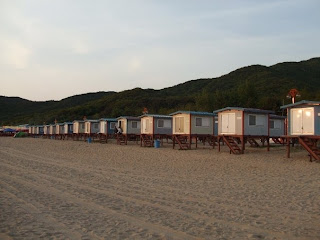Travel in South Korea is, for the most part, pretty straightforward. This isn’t Cambodia, where your bus is going to stir reluctantly to life at the start of the trip only to die with a cough and a splutter at some tiny town that brings new meaning to the phrase ‘middle of nowhere’ or Myanmar, where you can kiss any chance of sleeping through your night bus trip goodbye as you’re hauled outside for passport inspection at numerous check points. Nevertheless, there are a few things that will make your trips around the country run a little more smoothly if you bear them in mind...
Learn to Read Hangul
It takes about two hours- you could do it in a couple of long subway rides. Grab a book or a printout off the internet, or just ask a friend for help. Not only does it make your everyday life heaps easier, it also means that you will avoid ending up on the wrong side of the country thanks to the lack of consistency in Romanising Korean place names. Plus many smaller destinations have road signs in Hangul only. Definitely a couple of hours well spent.
Beat the Crowds (or at least be prepared for them)
Anyone who lives in Seoul knows how crowded Korea is. Whilst you might expect this in the capital city, it can come as a shock to realize that rest of the country can be just as packed as the subway at rush hour. Being trampled by an adjumma on Line 2 is one thing, but halfway up a mountain? Come on....
If you are looking to avoid the crowds, that means avoiding particular places at certain times of the year. Many Koreans tend to be quite focused on the idea that certain activities are meant to be done at certain-quite limited- times of the year. Probably the best example of this is the summer beach period-for around 2 weeks in July and August, almost every easily accessible beach in the country is crammed with visitors but outside of that, many are empty no matter how good the weather. The upside is that it’s often possible to take advantage of this by visiting at other times and almost having the place to yourself-early September is normally a great time to hit the beach in Korea, although the rain may put paid to that idea this year. Other crowd flashpoints include Seoraksan in autumn for the leaves changing colour and anywhere with cherry blossom trees (Jinhae and Gyeongju are particularly popular) in the blossom season in spring.
The alternative is to embrace the crowds and enjoy the upsides-the convivial atmosphere at festivals, the sharing of soju and fruit on mountain tops and the general hospitality and friendliness of Koreans out and about enjoying their leisure time.
Timing is Everything
Following on from the theme above, when you have masses of people all wanting to escape the city for the weekend, you also have some massive logistical issues. Traffic out of Seoul on the weekends can be the stuff of nightmares if you are unlucky enough to get caught in it. The obvious alternative is to use the train, especially with the availability of the speedy KTX service. However tickets tend to book up pretty quickly for some services and the KTX can also be quite pricey, with a return from Seoul to Busan costing around 100,000. If you do take the bus, the best advice is to leave as soon as you can-there are late night buses to many destinations, which often cruise along relatively traffic free, especially if you leave after 10.00pm. Alternatively, getting up really early on Saturday is also a smart option. It can also be a good idea to use more local bus depots rather than the central Seoul terminals such as Dong Seoul and Express Bus Terminal. Most satellite cities of Seoul will have at least one or two cross country services which can save a lot of time. This is where reading Hangul helps-do some digging online or ask a Korean friend to help out. When returning to the city, afternoon-shift workers might want to consider coming back in on Monday morning if the trip isn’t too long.
A Good Night’s Sleep
Many readers will have already discovered the joy of the ‘love motel’-the seedy sounding crash pad of choice for travellers and privacy-starved couples alike. These are actually one of the greatest things about travelling in Korea-for between 30,000-60,000 a night you can often expect a clean, spacious room with a variety of amenities ranging from flat screen TV and PC to an in-room Jacuzzi! Love motels are often clustered together in the same area, making it easy to compare facilities.
The other budget friendly way to sleep is to make use of the Korean style rooms in ‘Pensions’. Usually found at the beach or in the countryside, these guesthouses often have large, ondol heated rooms where guests sleep on mats on the floor. With prices from as low as 100,000 for a room sleeping ten, these can be a great deal if you’re travelling in a large group.
Get off the Beaten Track
Whilst Korea has some deservedly famous tourist sights-Gyeongju, Seoraksan and Jeju do, amongst others-it’s often the little things that make you really appreciate travelling in this country. Whether it’s being force-fed soju shots by grandmothers in front of a crowd of curious children on an otherwise empty beach, or being offered a lift in a police car after you stopped to ask for directions, it’s the people here, not just the places, that will make your trips memorable.
An honorary mention goes to the Korea Tourism Hotline-dial 1330 for free travel advice in English. They can help with transportation, accommodation bookings and generally anything to do with travel and tourism. Reports of this service have run the gamut from ‘fantastic,’ to ‘useless,’ so it’s probably luck of the draw depending who picks up the phone. Definitely worth a go if you don’t speak Korean.
Links:
• http://www.hotel365.co.kr/ (Korean) ‘Love Motel’ website-many listings are for Seoul but also covers some parts of Gyeonggi-do, Daegu, Busan, Gwangju, Chuncheon, Daejeon and Jeju.
• http://www.kobus.co.kr/web/eng/02_service/service01.jsp (English) Long distance buses from satellite cities.
• http://www.easyticket.co.kr/ (Korean) Buses from Central City (Opposite Express Bus Terminal, Gangnam) and some from Dong Seoul Terminal.
• https://www.ti21.co.kr/ (Korean) Buses from Dong Seoul Terminal.
• http://info.korail.com/2007/eng/eng_index.jsp (English) Train schedules and reservations.





























